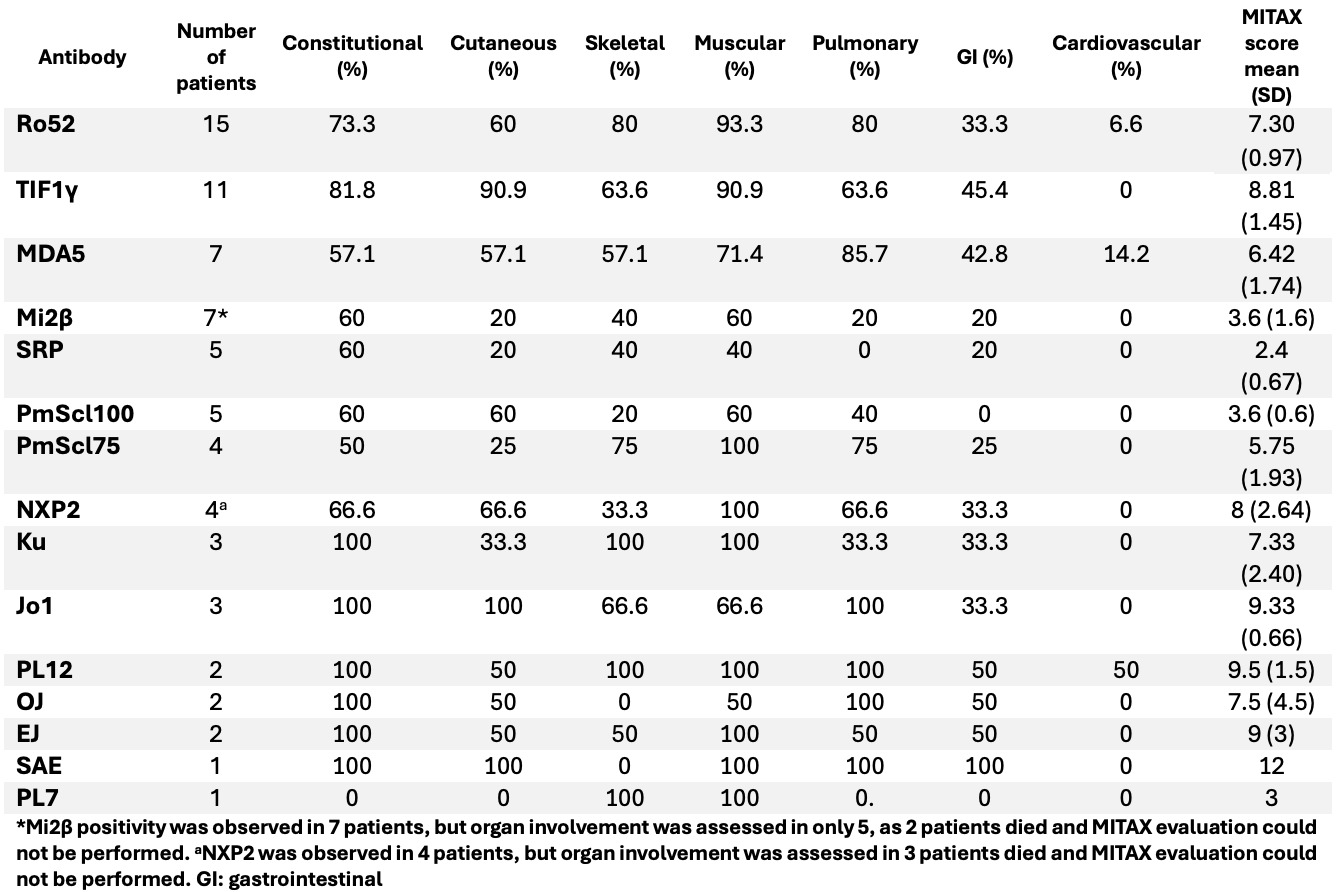Session Information
Date: Tuesday, October 28, 2025
Title: (2052–2078) Muscle Biology, Myositis & Myopathies – Basic & Clinical Science Poster III
Session Type: Poster Session C
Session Time: 10:30AM-12:30PM
Background/Purpose: Idiopathic inflammatory myopathies (IIM) are rare diseases that involve chronic muscle inflammation, weakness, and pain. Autoantibodies in IIM play a central role in disease pathogenesis and are classified as myositis-specific antibodies (MSA) or myositis-associated antibodies (MAA)1. While antibody-related phenotypes may vary by geographic region, data on phenotype stratification by autoantibody profile in Hispanic populations remain scarce. Recognizing distinct clinical phenotypes associated with specific autoantibodies is essential for guiding early diagnosis and individualized therapeutic decisions. We aimed to describe organ-specific disease activity patterns by serological profiles in a Hispanic IIM cohort.
Methods: We conducted a cross-sectional, retrospective study of Hispanic patients with IIM diagnosis per 2017 ACR/EULAR criteria or clinical judgment. Disease activity was assessed using the MYOACT and MITAX scales. For patients with multiple antibodies, activity scores were attributed to all antibodies detected. Patients were additionally grouped as: monopositive (one autoantibody present), and multipositive (≥2 autoantibodies). Clinical and serological data were compared using Mann-Whitney U and chi-squared or Fisher’s exact tests. A p-value ≤ 0.05 was considered statistically significant.
Results: Forty patients were included (mean age 46.8 ± 15.9; 85% women). Disease activity scores and antibody profiles were available in 38 patients; two died during follow-up due to disease activity. Fifteen autoantibodies were identified, most commonly Ro52 (n=15), TIF1γ (n=11), and MDA5 (n=7). Mean MITAX and MYOACT scores were 11.2 (±9.1) and 14.59 (±11.02), respectively. The most frequently affected domains were muscular (73.7%), constitutional (65.8%), and skeletal (57.9%). Stratified by autoantibody positivity, 38 profiles were analyzed (two lacked myositis panel). Pulmonary involvement was most common in MDA5 (85.7%) and Ro52 (80%) positive patients. (Table 1) Cardiovascular involvement was rare, seen only in Ro52, MDA5, and PL12. Sixteen patients were monopositive (TIF1γ n=4, MDA5 n=3). (Table 2). Although multipositive patients (n=22) showed a trend toward higher damage and activity scores, differences were not statistically significant. However, when stratified by organ domain, muscular involvement was significantly more frequent in this group (90.5% vs. 50%, p=0.03). Antibody profile patterns varied across our cohort (Table 3). Two patients died: one had a diagnosis of renal cancer and both Mi2β and NXP2 positivity; the other had isolated Mi2β.
Conclusion: Disease activity patterns differ by autoantibody profile. MDA5, Ro52, and TIF1y were strongly associated with pulmonary involvement, while patients with anti-synthetase (ARS) antibodies (OJ, EJ, PL12, PL7, and Jo1), Ku, and SAE associated mainly to muscular activity. These findings, though limited by small sample sizes, may support earlier recognition of high-activity phenotypes and organ-specific complications in IIM subgroups, particularly within Hispanic population.
 Table 1. Organ involvement and mean MITAX score stratified by autoantibody in idiopathic inflammatory myopathies.
Table 1. Organ involvement and mean MITAX score stratified by autoantibody in idiopathic inflammatory myopathies.
.jpg) Table 2. Clinical and damage characteristics in patients with single and multiple autoantibody positivity
Table 2. Clinical and damage characteristics in patients with single and multiple autoantibody positivity
.jpg) Table 3. Antibody profile patterns
Table 3. Antibody profile patterns
To cite this abstract in AMA style:
cantu v, Dominguez-Chapa E, Polina-Lugo R, Bardan Inchaustegui A, garcia-Carrillo f, Reyna-Hernandez E, Mejia-Rodriguez D, Arvizu-Rivera R, Cardenas-de la Garza J, Villarreal-Alarcón M, Galarza-Delgado D. Organ-specific disease activity and serological patterns in idiopathic inflammatory myopathies: A descriptive study in a Hispanic cohort [abstract]. Arthritis Rheumatol. 2025; 77 (suppl 9). https://acrabstracts.org/abstract/organ-specific-disease-activity-and-serological-patterns-in-idiopathic-inflammatory-myopathies-a-descriptive-study-in-a-hispanic-cohort/. Accessed .« Back to ACR Convergence 2025
ACR Meeting Abstracts - https://acrabstracts.org/abstract/organ-specific-disease-activity-and-serological-patterns-in-idiopathic-inflammatory-myopathies-a-descriptive-study-in-a-hispanic-cohort/
